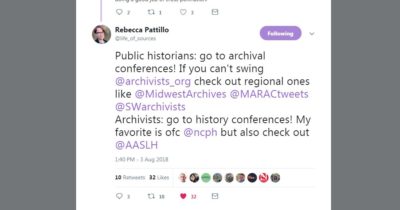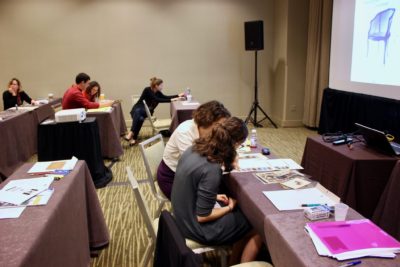Advocating for archivists
16 August 2018 – Marla Miller, Christine Crosby, and Stephanie Rowe
 On July 29, 2018, The Chronicle of Higher Education published a piece by Alice Dreger entitled “The Delicate Art of Dealing with Your Archivist” (originally behind a paywall, the article is now publicly accessible). In the article, Dreger, a historian of science and medicine, breaks down the types of archivists a researcher may encounter by a “basic taxonomy.”
On July 29, 2018, The Chronicle of Higher Education published a piece by Alice Dreger entitled “The Delicate Art of Dealing with Your Archivist” (originally behind a paywall, the article is now publicly accessible). In the article, Dreger, a historian of science and medicine, breaks down the types of archivists a researcher may encounter by a “basic taxonomy.”
Dreger acknowledges at the end of her article that the majority of archivists are “mensches,” who know “the collection material well enough to truly help you, and trust you enough to let you lead,” but her descriptions are unflattering at best, and ignore the intellectual and physical labor of archivists, who quickly reacted negatively via the Chronicle itself, on Twitter, and on Facebook. Most comments noted that the piece was offensive and that it demeaned and devalued the work of archivists. Following the social media backlash, written responses soon made the rounds (for example an open letter by Libby Coyner, David McCartney’s Letter to the Editor on “Seven Additional Types of Archivists,” and Michael Brene’s “Historians Just Don’t Get Archivists. Here’s Why” at the Chronicle).
Among the strong reactions against the article were calls for organizations that support archivists to do or say something in support of archivists and the important work they do. On August 1, the Society of American Archivists’ (SAA’s) president, Tanya Zanish-Belcher, wrote a letter in response to the article that concluded that “all of us—researchers and archivists alike—are on the same side.”
A few days after the article first appeared, the @ncph Twitter account was tagged with a query asking if we would be issuing a response. Our volunteer Twitter manager shared the comments with staff to make them aware of the situation, and the staff in turn shared them with NCPH’s executive director, president, and chair of the NCPH Advocacy Committee, beginning internal conversations about how to respond. Meanwhile, over the weekend Dreger, the original author, issued an apology and requested that her original piece be retracted and the Chronicle responded by publishing the two responses linked above.
Where does all this leave us?
Most importantly, these events give us an opportunity to affirm our commitment to, and respect for, the archivists whose work makes historical research possible.
The tagging of NCPH in connection to such conversations also gives us an opportunity to share some behind-the-scenes information on how NCPH responds to requests that we weigh in as an organization on public events.

Identification and Care of Photographs Workshop, 2017 NCPH Annual Meeting. Photo credit: NCPH
So, first: NCPH embraces the premise that all those who work with history have commonalities that unite us more than the specifics of particular skillsets divide us. Historians, archivists, and other public historians all share a commitment to evidence-based analysis. But we can always do better in terms of understanding the distinct challenges faced in the various arenas of public history practice. NCPH member and archivist Rebecca Pattillo’s tweet calling for more understanding and overlap between public historians and archivists by attending each other’s conferences was justifiably well received in the midst of this controversy. NCPH continues to strive toward bridging gaps such as this one. For example, this week representatives from the NCPH staff and board will be attending SAA’s annual meeting to discuss further collaboration, and SAA representatives have been invited to NCPH’s 2019 conference in Hartford to continue the conversation.
Second: In today’s digital world, advocacy issues move quickly. But the nature of NCPH as a membership organization means that our responses take some time. In the past, issues were almost always brought directly to the NCPH executive director or president via email with a specific request for action (i.e. a letter sent to a specific entity or person, or an official statement on an issue), but increasingly, requests are less specific and are brought on social media. In such cases, extra time is needed to route the comments to the appropriate parties and to determine what exactly is being asked of us. As public historians, our core values include consultation and collaboration. When queries like this come in, the NCPH executive director shares them among members of the Advocacy Committee (which consists of the members of the Executive Committee of the board plus several additional non-voting members with special skills and interests in advocacy issues) in order to come to a collective understanding (and consensus)—a process that can be time consuming, but ensures that we gather a wide range of perspectives before acting. Then come the mechanics of formally voting, which can also be slow even via email. Notices of resulting statements or letters are then reported to the membership at the time of action in the weekly Public History News Update email, semi-annually in print in Public History News under “Actions of the Board,” and on the advocacy page of the website, which also includes our official Advocacy Policy.
In this instance, the immediate issue was resolved by the time organizational leadership was notified of the article and the inquiry regarding NCPH’s response. This turned our organizational focus to crafting this History@Work post to reiterate our existing commitments to supporting archivists as professionals in our field and to share how we conduct our advocacy work, rather than to craft an official statement which would have been out of date by the time of publication. We were pleased to see so many NCPH members weigh in on social media to express their support of archivists as professional public historians and a part of the fabric of the NCPH community, and we appreciate our alert members staying abreast of issues as they unfold, and bringing them to our attention. The current membership of our Advocacy Committee can be found online.
~ Marla Miller is president of NCPH’s Board of Directors, Christine Crosby is NCPH’s Membership Manager, and Stephanie Rowe is executive director of NCPH. They would like to acknowledge the members of the NCPH Advocacy Committee of the Board for their contributions and feedback.



